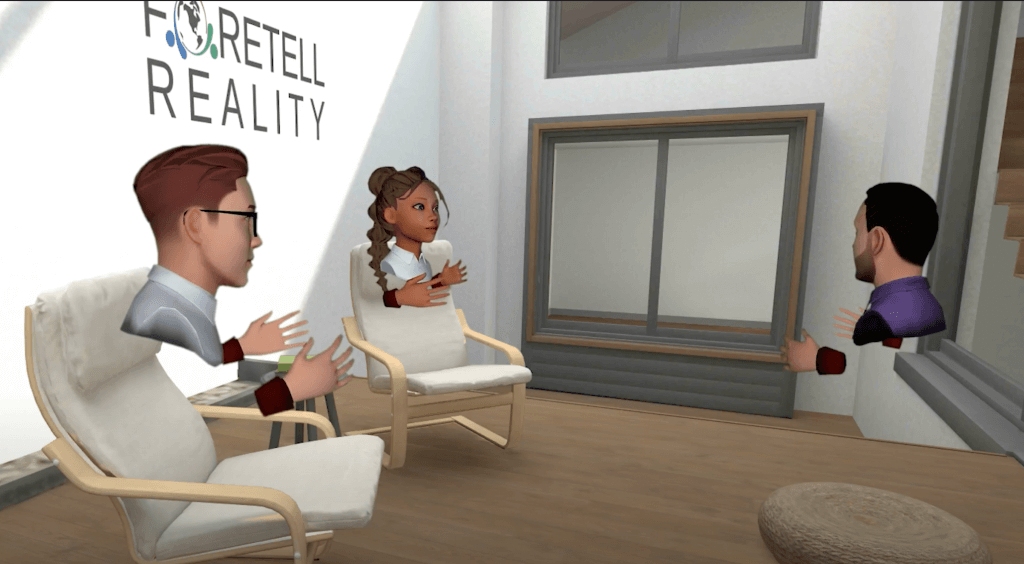Foretell Reality, one of more than a dozen subsidiaries of The Glimpse Group, provides a collaborative space where therapy attendees can interact and support one another from the comfort of their own homes.
A Diverse Ecosystem of AR/VR Solutions
The NYC-based VR and AR platform company, Glimpse Group, brings forth an ecosystem of diverse augmented reality and virtual reality solutions on a global scale. It has been providing robust solutions to over 200 customers through its 13 subsidiary companies since 2016.
The Glimpse Group delivers a number of solutions across different sectors – healthcare, education, marketing, and more. Foretell Reality is an AR/VR platform with a focus on collaboration and life-like interaction. It offers a virtual co-working space for participants to engage in group discussion and mimic the nuances of physical human interaction. Foretell Reality is just one example of robust solutions The Glimpse Group has to offer for a streamlined VR experience in pressing matters of reality.
Virtual Reality and the State of Remote Healthcare
The healthcare industry is among those to benefit greatly from the opportunities and experiences that virtual reality grants to its stakeholders. Foretell Reality puts its platform to the test as a virtual space to host group therapy sessions. North-Star Care is a telehealth program meant to treat and support individuals recovering from alcohol abuse. It is also an adopter of Foretell Reality to enhance remote group therapy with virtual reality technology.
“VR helps solve a few shortcomings of remote therapy by recreating the lifelike, three-dimensional settings and interactivity of in-person therapy, making therapy a shared, immersive and interactive experience,” Dror Goldberg explains. Goldberg is The Glimpse Group VP of Product and Foretell Reality General Manager.
“In short, VR helps transform people’s perception of therapy by making therapy more convenient, less intimidating, and ultimately more accessible for anyone seeking help,” Goldberg continues. With virtual reality, attending therapy sessions becomes less of a troublesome or anxiety-inducing experience, allowing more participants to make progress in their recovery.
Foretell Reality, the Next-Gen Solution for Inclusive Therapy and Mental Health Support
By adopting mixed reality technologies in remote healthcare provisions, patients are offered an avenue to receive medical care and attention regardless of their location. 3D avatars protect the patients’ identity and emphasize anonymity. This can help patients and individuals gain the confidence to provide more insight into their situation without fear of being judged.

“The anonymity and confidentiality which VR offers have been proven to ease one’s hesitation toward getting help, especially among newcomers to therapy who can more easily explore their options – programs, therapists, and group – in VR,” Goldberg points out.
Empathy and support are also integral in the healing and treatment of patients. For instance, AA meetings assure attendees that they are not alone in their journey to recovery. In a virtual reality setup, the participants’ avatars instead exchange reassuring pats, hugs, and applause. Existing technology today has yet to simulate physical touch, but VR has already made waves in encouraging people to interact and express themselves comfortably.
Foretell Reality also has specially-designed features to facilitate interaction and empathy. On top of providing a safe and inclusive meeting place, attendees can share more of their experiences and stories with a full 360° view of their surroundings through images or videos. Such a feature allows for a more immersive experience of empathizing with a participant’s backstory or memorable moments.
Are We Getting Closer to a Mass Adoption of Virtual Reality in Healthcare?
Remote healthcare programs have long been part of the industry. Virtual reality as a driver for remote healthcare, on the other hand, has yet to become accessible to the general public.
Virtual reality equipment is still far from mass production, making it difficult for the majority to access compatible hardware like VR headsets and processors. Nonetheless, technology is quick to catch up, and most emerging insurance and healthcare programs are optimizing their plans to accommodate AR/VR technology.
“We’re not quite at the point of mass adoption, but there are a lot of developments across the industry which are allowing us to close in on that point,” Goldberg said. “Naturally, like any new technology that brings real benefits to users, adoption and accessibility will grow over time.”
Revolutionary Technology in Providing Therapy and Care for All
As virtual reality continues to evolve at an exponential pace, Foretell Reality anticipates streamlined functionality for a more wholesome therapy session.
As gear like the Meta Quest 2 and advanced technology like replicating micro-expressions and more are nearing their arrival, virtual reality and telehealth can expect massive transformations in their efficiency of bringing accessible care and treatment to everyone.




